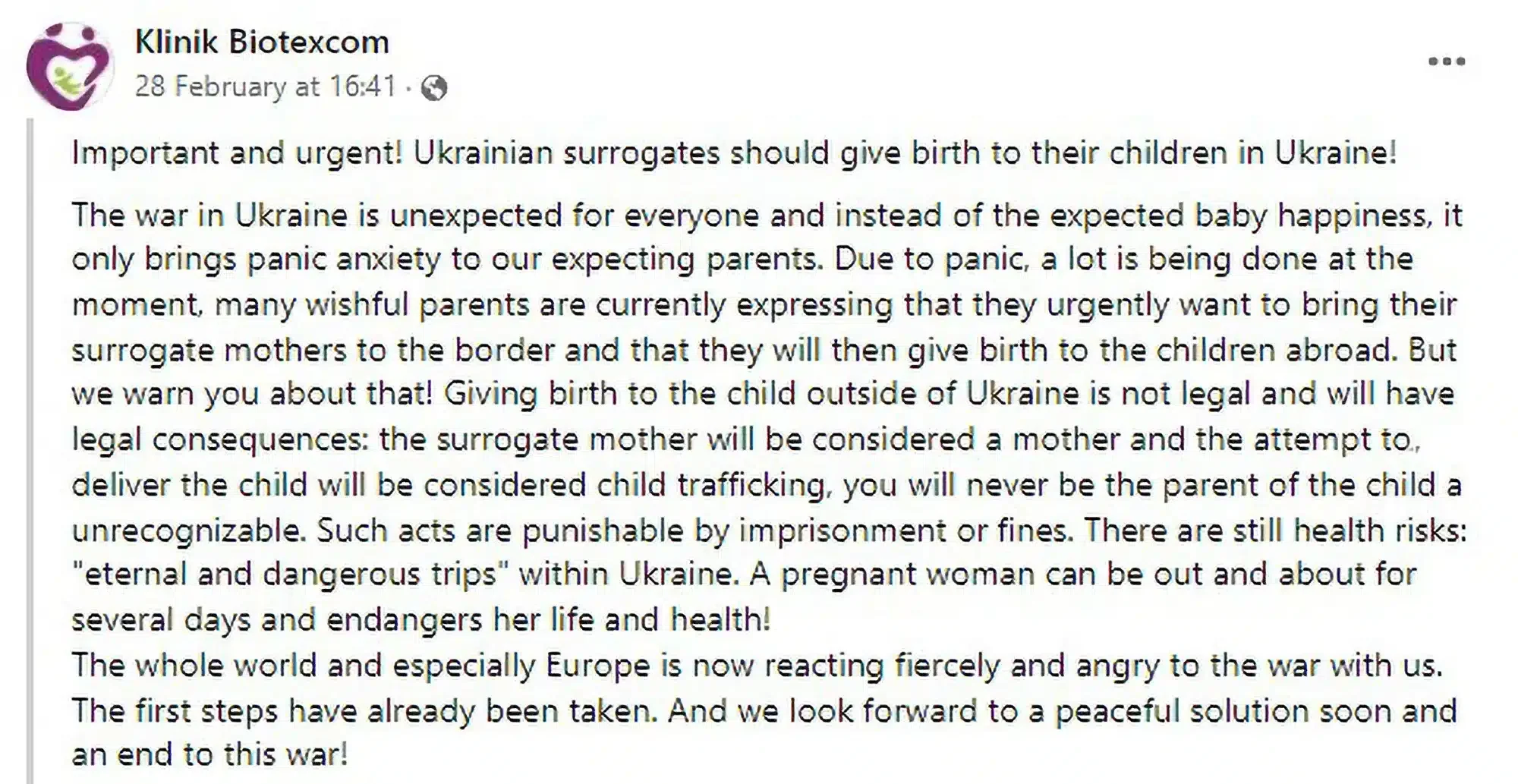A Job That Isn’t Your Own

Just a few days ago, popular podcaster Dave Rubin of The Rubin Report announced that he and his partner are expecting two babies, one due on August 22, and the other due on October 14.
How, you might wonder, can one couple be expecting two babies just two months apart? Well, Rubin is a man who is in a same-sex “marriage” with another man, David Janet. In a photo announcement the two men sit side-by-side, holding two ultrasound photos of the two babies with a placard listing the due dates in between them.
Since biology still exists, these children must have mothers. At the least there are two surrogate mothers – i.e., women who have either volunteered or been paid to carry Rubin and Janet’s children, and who may also be the genetic mothers. However, it is likely that there are two other women – i.e., the biological mothers – who gave their eggs for the process. All of these women are entirely missing from the picture.
It is very difficult to write or speak about this topic in the current cultural and political climate. On the one hand, behind this announcement is a deeply natural, and even commendable human desire to engender children. And then, of course, there are the two children involved: beautiful, unique humans about to enter into the world. To respond to such an announcement with anything but unalloyed joy seems to some people to be nothing less than heartless, and inevitably brings swift condemnation.
On the other hand, there is something so deeply disturbing and dehumanizing about the practice of surrogacy that it seems clear that we are duty-bound not to let the superficial feel-good aspects of such stories dissuade us from pointing out the uncomfortable truths involved, and working strenuously to curtail the exploitative, multi-billion dollar surrogacy industry.
Ukraine War Shines Spotlight on Surrogacy Industry
Rubin and Janet’s announcement comes as many eyes are riveted to the plight of a host of surrogate mothers caught in the crossfire of the horrific invasion of Ukraine.
Ukraine is one of the few countries in the world that allows international commercial surrogacy. According to reports, some 2,000-2,500 children are born to surrogate mothers per year in the country. There are firms that set up lucrative deals with foreign buyers and Ukrainian women, who are paid temptingly large sums of money to carry other people’s children. As AlJazeera reported in 2018, at the time one firm was paying Ukrainian women $11,000 and a $250/month stipend – more than three times the average Ukrainian salary. Many of the women who respond to the advertisements to become surrogates are already mothers, and are financially poor.
However, the practice of surrogacy is fraught with ethical and practical pitfalls, leading to inevitable conflicts of interest between the contracting couples (who may or may not be genetically related to the child) and the surrogates. Even in the best of times, these conflicts of interest can lead to painful situations, as the surrogate mothers seek to protect their autonomy while being contract-bound to offer their bodies 24/7 for a form of “work” that touches on every single aspect of their lives.
These conflicts of interest have been brought into sharp relief by the outbreak of the war. At the time of the invasion, hundreds of Ukrainian surrogate mothers were living in Kyiv. With the Russian army bearing down on the city and shelling civilian population centers, the health and lives of these women – and the unborn children they are carrying – were put at risk.
According to reports, frantic foreign parents have been attempting to contact their pregnant Ukrainian surrogates, demanding that they flee to safer locations. However, many of the surrogate women have families of their own, and are torn between their responsibilities to their families, their country, and the foreign couples for whom they are carrying the child.
As The Atlantic reports:
[I]n Ukraine, being a surrogate is not only a job; it is often a well-paid job. But most jobs you can quit, or at least put on hold. This one you can’t, really. This one might keep you from your family or from acting on your sense of duty to your country. It might physically impede your ability to get to safety. It might require you to seek medical attention even as medics are overrun with the injured and dying.
Some people in wartime can turn all of their attention to family and the war effort, but surrogates cannot. Even if they defy pleas to go to places of safety, they carry their work with them, inside their body.
The New York Post reports that some surrogates who have fled the war zone are being required to risk their lives by returning to Kyiv in order to give birth to their babies. This is due to the fact that in neighboring countries surrogacy is illegal, which means that it could be incredibly difficult, if not impossible, to ensure that the children end up with the foreign couples. As one surrogacy agency warned, any attempt by a foreign couple to collect a child born outside Ukraine could be viewed as child trafficking.
One surrogacy agency has set up a bomb shelter for surrogate mothers in Kyiv, with cribs, food, medical supplies, and gas masks. CNN reports on the plight of 21 children already born to surrogate mothers. The foreign parents are now scrambling to figure out how to collect these children in the midst of a conflict that has killed hundreds of civilians.
The Inherent Exploitation of Surrogacy
There is something intensely surreal, even dystopian, about the photos of dozens of babies in bassinets in a bomb shelter in Kyiv, being cared for by nurses paid by surrogacy agencies. Where are these children’s parents? Where are their mothers?
CNN describes one surrogate mother arriving at a bomb shelter, after racing through the city at 100 mph to avoid being hit by missiles, in order to hand over the child she had given birth to a week ago. “It is even harder that he is in a place where there is shelling,” said the woman, holding back tears. “And when will his parents get to take him away because of it? It’s really hard.”
Meanwhile, one nurse told CNN that she would stay with the children no matter what, even as her own husband and daughters had fled the city. The babies “can’t be abandoned,” she said. “They’re defenseless. They also need care. And we really hope that the parents will come and pick them up soon.”
While the bravery of these nurses to stay and care for these babies is to be commended, so much else of this scene is wrong. These poor children should be in the loving arms of their parents, not in a bomb shelter in Kyiv, one of dozens of other children on a production line who have been bought and sold in an industry that is inherently dehumanizing for everybody involved.
It is precisely because the internal logic of surrogacy inevitably leads to practical and moral quagmires like this that the Catholic Church has been so firm in opposing the practice. In a 1987 document on bioethics, Donum vitae, the Congregation for the Doctrine of the Faith said of surrogacy that it
represents an objective failure to meet the obligations of maternal love, of conjugal fidelity and of responsible motherhood; it offends the dignity and the right of the child to be conceived, carried in the womb, brought into the world and brought up by his own parents; it sets up, to the detriment of families, a division between the physical, psychological and moral elements which constitute those families. (§A, no. 3)
Meanwhile, the Catechism of the Catholic Church broadly condemns the practice, noting:
Techniques that entail the dissociation of husband and wife, by the intrusion of a person other than the couple (donation of sperm or ovum, surrogate uterus), are gravely immoral. These techniques (heterologous artificial insemination and fertilization) infringe the child’s right to be born of a father and mother known to him and bound to each other by marriage. They betray the spouses’ “right to become a father and a mother only through each other.” (no. 2376)
What Catholic teaching recognizes is that procreation is one of the most miraculous and beautiful aspects of human existence, reaching into every aspect of the lives of parents in the profoundest ways. Mothers, especially, are called to give of themselves in a special way, offering their whole bodies for the most intimate process of nurturing and growing a human being.
Surrogacy takes this sacred process and reduces it to a commercial transaction, intentionally wrenching procreation from the intimate, loving relationship of husband and wife. It involves turning human life into a commodity on multiple levels. Women are wholly objectified as mere incubators. Children are treated as commodities to be bought and sold for a profit. Human life is treated as something to be manipulated in a laboratory, with embryos being created willy-nilly, and then selected and implanted into the wombs of surrogates based upon pragmatic criteria, and “excess” embryos being callously destroyed. Children who fail to meet certain standards set by couples who have spent tens, or even hundreds of thousands, of dollars, may be aborted, sometimes despite the protestations of unwilling surrogates.
We also cannot ignore that the cultural acceptance of same-sex couples and parenting have added to the complexity of these kinds of dilemmas. These situations bring additional complications into the lives of the children innocently caught in the middle and subjecting them to further ambiguity regarding their own identity and their relationship to their parents.
In the end, every child has a natural right to be conceived through an act of love between their father and mother, to be nurtured in the womb of their own mother, to be birthed by their own mother, and raised by their parents. Any deliberate effort to wrench procreation out of this context, and to reduce it to a commercial – or even an “altruistic” – transaction, thereby depriving children of one or both of their parents, is inherently debasing, and inevitably leads to the kinds of heartbreaking practical and moral muddles we are seeing play out in real time in Ukraine right now.
Surrogacy is a moral evil that raises grave ethical concerns. It undermines the respect owed to human persons and subverts the natural relationship between a husband and wife; it exploits women and treats children as commodities, as a kind of entitlement to be realized. Therefore, we must work fervently to end this evil, as well as close the IVF industry that makes it possible.
In closing, let us remember that no matter how children are conceived, no matter what situations they are born under, or conditions they are born with, we love and welcome each precious child, a gift into this world, but at the same time, we earnestly pray for that day when all life is embraced in the way that God intended.





Though the Catechism of the Catholic Church was written by bishops under the grace and guidance of the Holy Spirit, it was written by men– humans with their own prejudices, opinions, human failings, and opinions that naturally come through. Obviously No child should be created in order to be a slave or satisfy a whim, but a fully vetted adult couple should be allowed to have science help in conceiving a child, without their being ostracized. Each child should be loved and welcomed, no matter what the circumstance of conception, and it takes a village to raise a child.
just blown away about the reality of it all. feel God has been taken out of creation. So sad why do we keep coming up with ways to hurt God
Your argument against surrogacy is well written, and references to Catholic Church doctrine is helpful; however, as a born again Christian, I am more interested in what the unerring Word of God says about the subject.
Father,
Very interesting article! Thank you! Would you sometime address the issue of these “snowflake babies”?
Neighbors who have been infertile for years and years, gave up, and she had an embryo who had been frozen implanted, and just delivered a baby girl. Isn’t better to adopt these children and give them life before they are destroyed? Your thoughts , please.
Thank you.
Nan Martino
Thanks for the suggestion, Nan. I’ve passed your idea along to our education team.
The trick is not to use the language of the slaveholders. Homosexual couples are not quote married to each other; they can’t quote beget a child with each other; they are not spouses. What they have done is dressed up in marriage face and commercially procured a child slave. This child is an object to them made to order. Slave holders of the South also called their plantations a quote family even though that didn’t make them a family.
The proper response to Ruben and other marriage fakers is not to congratulate them on the procurement of some fine new slaves. It is to rebuke them for such procurement and a demand that they manumit these slaves to a family who can care for them. In the case of the IVF procured child, this would consist of a man and wife whose relationship embodies that which should have brought the child into conception. The Catholic psychologist, Paul Vitz, has written eloquently about the degree to which the child identifies with the bond between the mother and the father rather than the mother or the father. This is why divorce is so traumatic for children. He said you can almost draw a line between the mother and the father that line is what the child relates to. And that line represents the marital act which should have brought the child into existence.
Mom and Dad matter.